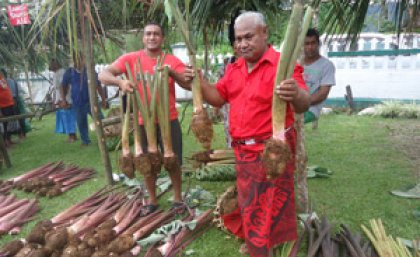
Australian research into the ‘best’ varieties of taro could open new markets and create greater food security in the Pacific region says a University of Queensland scientist.
UQ and Pacific Agribusiness Research for Development Initiative (PARDI) research leader Shane Dullahide said the research began with sensory tasting of the region’s top performing taro varieties among local growers and importers to determine consumer appeal.
“With a rapidly growing world population, a stronger Pacific taro industry will equate to long-term capacity to feed people in the region and to keep ownership of crops and their associated industries in the Pacific region,” said Mr Dullahide.
“Grower variety trials are now underway to determine which varieties have the best production capabilities and we envisage that ‘star’ performers from these trials will be identified quite rapidly as taro is a fast-growing crop.
“Sensory characteristics of several varieties have also been assessed by consumers in Auckland.”
Mr Dullahide said the research was designed to help the Pacific, one of the world’s biggest producers of taro, realise the value of their most significant root vegetable crop .
“This research will enable them (Pacific farmers) to have ready-access to clean planting material so they can grow more taro for export to countries like New Zealand, USA and Australia where Pacific taro is in high demand."
Trials are concentrating on a number of potential ‘elite’ varieties based on taste, blight disease resistance, climate resilience and production capacity.
The varieties were identified from a large breeding program undertaken in 1995 by SPC, USP and Samoa’s Ministry of Agriculture and Fisheries (MAF) under the AusAID Taro Genetic Resources Conservation and Utilisation project following a taro blight disease outbreak in Samoa in 1993.
The taro project will be complimented by PARDI retail research designed to help local industry determine how to meet the needs of local retailers and exporters.
Led by The University of Queensland’s (UQ) *PARDI is an Australian Government initiative that forms part of UQ’s Queensland Alliance for Agriculture and Food Innovation (QAAFI).
The research is part of a partnership between the Government of Samoa, Secretariat of the Pacific Community (SPC), University of the South Pacific (USP), Samoan growers, industry groups and various government bodies across the Pacific.
Special acknowledgements are extended to Moafanua Tolo losefa, Assistant Lecturer and Manager, USP/SPC Taro Improvement Project, Valerie Saena Tuia, SPC LRD Genetic Resources Coordinator who plays a critical role in the Pacific taro research (including the current PARDI activities) and Dr Mary Taylor who completed considerable groundwork prior to the PARDI project.
Thanks are also extended to Samoa’s MAF and the Scientific Research Organisation of Samoa in particular Tilafono David Hunter,Kuinimeri Asora Finau and co-worker Richard Beyer who also play a crucial role in carrying out sensory evaluation research for exported varieties that would benefit the region.
Media: Shane Dullahide, s.dullahide@uq.edu.au or on mobile number +61 0438 811 285 or PARDI Communications Julie Lloyd, 0415 799 890
Background
*PARDI
The Australian Government provides significant support for the ongoing development of agricultural industries in the South Pacific region including through the Pacific Agribusiness Research for Development Initiative (PARDI).
PARDI commenced in February 2010, is coordinated by The University of Queensland and funded by the Australian Centre for International Agricultural Research (ACIAR). PARDI seeks to create sustainable livelihood development outcomes for the South Pacific forestry, fisheries and crop-based sectors. Scientists undertake supply-chain and market-driven research to identify constraints that impede local economic development. Research is aimed at achieving tangible solutions, such as new skills for locals, new technologies and product options.
PARDI is a partnership that involves The University of Queensland under the Queensland Alliance for Agriculture and Food Innovation (QAAFI), The University of the South Pacific, the Secretariat of the Pacific Community, University of Adelaide, James Cook University, The University of the Sunshine Coast, the Queensland Government’s Department of Agriculture, Forestry and Fisheries (DAFF) and Southern Cross University.
To find out more about PARDI, go to ‘Focus Areas’ at the following web site:
http://www.spc.int/lrd/




